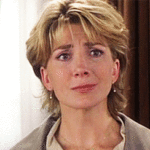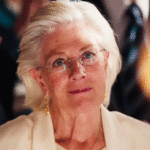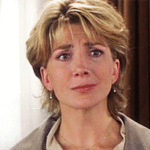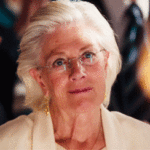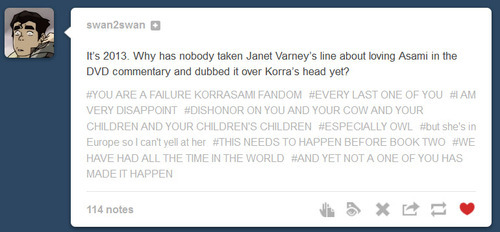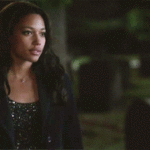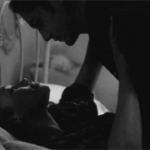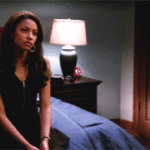welp it’s 2013 and the deed is done
fellow korrasamis rejoice
you’re welcome
IM SCREECHING WOW
welp it’s 2013 and the deed is done
fellow korrasamis rejoice
you’re welcome
IM SCREECHING WOW
welp it’s 2013 and the deed is done
fellow korrasamis rejoice
you’re welcome
IM SCREECHING WOW
According to the professor of my young adult fiction writing class, John Green is the revolutionary who brought back the young adult novel and made reading and writing cool again.
Bravo, dear Mr. Green, and thank you for making it possible for me to read, study, and enjoy your work as a class requirement.
😀
Okay, this actually makes me pretty upset?
(That is not your fault, how-could-i-ever-hope, so this is not directed at you!)
But YA writing has been “revolutionary” and integral to many young people’s lives for years and years and years. Tamora Pierce wrote her first series in the eighties and it is still highly influential and beloved today. Laurie Halse Anderson’s beautiful and powerful novel Speak was published in 1999. How I Live Now by Meg Rosoff was published in 2004 and won a landslide of awards. Walter Dean Meyers, Carolyn Mackler, Angela Johnson, Madeline L’Engle, Judy Blume, Christopher Pike, Margo Lanagan, Lois Lowry, MT Anderson, Markus Zusak, and many more were already publishing amazing, influential, much-beloved YA books in the early 2000’s and before.
Looking For Alaska, John Green’s first novel, was published in 2005 — the same year the first Twilight book was published. LfA won the 2006 Printz and started quietly making waves, as literary novels often do, but didn’t really “break out” until much later after he’d gained a following. It became an enormous following, do not get me wrong, but there’s a timeline here.
Say what you will about Stephenie Meyer and the Twilight series, but the boom in YA? The point around 2005 where it EXPLODED and started pumping out book after book? It was because of that series. Whatever your feelings about it are, it blew open the doors for publishers to take bigger risks and try different things in YA. It proved a YA series could, in fact, be “the next Harry Potter.” (Fun Fact: Meyer and Green have the exact same literary agent!)
So to see that someone who knows literature, someone like a collegiate literature/writing professor, is saying that John Green is THE revolutionary who “brought back” the young adult novel? Oh my god that makes me so upset. It discounts all the hard-working and incredible authors who have been writing YA before it was a moneymaker, before it made you “cool.” Of which John Green is a part, to be fair, since his first novel came right before the boom and he is a literary writer, which is not the most lucrative of book markets, typically.
Caveat: this is not a “let’s crap on John Green post,” because that’s not how I feel and not how I roll. I do not want to discount that John Green IS influential and he (and his work) DOES resonate very strongly with A LOT of young people. This is not me trying to say that he’s not an important piece in this puzzle, because he is.
But do you see my problem here? Do you see why I get so PISSED OFF when people scoff and handwave and shit all over YA, but then they go, “Oh, but John Green! He’s the Savior Of YA! Without him, it would all be pointless drivel or it NEVER would have been cool to read and write again!”?
It’s discounting a class of novels (those written for young people) that is HUGELY HUGELY HUGELY influenced and written by ladies and minority writers who can touch the hearts of young people. It completely discounts the pop culture powerhouse and influence of the Twilight series, whether or not you think it’s “great literature.” Which I personally do not, but my opinion of its literary merit does not affect the fact that it was HIGHLY INFLUENTIAL. If you’re going to give a single person all the credit for “bringing back” YA and making it “cool” (which is a flawed premise to begin with, but whatever), it should probably go to Ms. Meyer, if we’re honest.
Just… WHARRGARBL. STOP HOLDING UP JOHN GREEN AS THE ONLY YA AUTHOR WHO MADE A DIFFERENCE, WHO WRITES POWERFUL BOOKS, WHO GAVE READING BACK TO KIDS. STOP IT STOP IT STOP IT STOP IT. You can love and admire someone without attributing that kind of power to them, especially when it’s at the expense of other incredibly talented individuals. Many of whom happen to be not white guys.
Wow that got intense.
ALL OF THIS.
And can we talk about how conveniently, the supposed savior of YA is a guy? Can we talk about how the three best-selling YA series in the past few decades—Harry Potter, Twilight, The Hunger Games—were all written by women, but John Green is the one that saved the genre? Can we talk about how incredibly culturally influential Harry Potter has been, how many young kids only got into reading because they wanted to read Harry Potter, how fan culture around Harry Potter has spurred on a new generation of writers, and yet John Green is the revolutionary?
Can we talk about how the only reason people freak-the-fuck-out about YA being “dominated” by female authors writing for girls is because traditionally, “YA for boys” was just called “literature”? Can we talk about how Tamora Pierce and JK Rowling are YA but Patrick Rothfuss and Lev Grossman are Serious Fantasy?
Can we talk about how this is not just a YA issue? How the incisive cultural commentary of Jane Austen is even now dismissed as vapid chick lit with male students barely deigning to force themselves through it for an English credit, but Tolstoy and Flaubert and Ibsen, who also wrote about romance and social constraints placed on women and unrequited love and the treachery of upper class society, are revered?
Can we talk about how stories of boys becoming men are called Bildungsromans and make their way to syllabi around the continent, but stories of girls becoming women are called shallow and insubstantial? How Nora Roberts has to write her wildly popular In Death series under a male-sounding pseudonym while John Grishom and Dan Brown pump out book after book after book that are literally just the same plot with different character names to great acclaim?
Can we talk about how, of all the romance that exists on the market, Nicholas Sparks’ formulaic saccharine “dude with a boat and a puppy” drivel is the stuff that gets adapted into movies year after year after year?
It doesn’t surprise me that the prof would laud Green over all the writers who came before him who paved the way. Literature writers, by and large, skew male. And they tend to write about books written by men, and tend to interview those male authors. If all you know about YA is the stuff you got in mainstream reporting in the last few years, of course you would think that nothing worthwhile in YA existed before Green.
But if I were in that class, and the prof exhibited so little critical thinking about the state of the industry and its social politics and understanding of literary history, I would definitely think thrice before taking that professor’s word on anything else.
I love John Green’s books, and I can’t stand Twilight, but it would be Meyer that I would credit with the revival of the YA genre,
It’s the only positive thing I’d credit her with, but it is her achievement.
According to the professor of my young adult fiction writing class, John Green is the revolutionary who brought back the young adult novel and made reading and writing cool again.
Bravo, dear Mr. Green, and thank you for making it possible for me to read, study, and enjoy your work as a class requirement.
😀
Okay, this actually makes me pretty upset?
(That is not your fault, how-could-i-ever-hope, so this is not directed at you!)
But YA writing has been “revolutionary” and integral to many young people’s lives for years and years and years. Tamora Pierce wrote her first series in the eighties and it is still highly influential and beloved today. Laurie Halse Anderson’s beautiful and powerful novel Speak was published in 1999. How I Live Now by Meg Rosoff was published in 2004 and won a landslide of awards. Walter Dean Meyers, Carolyn Mackler, Angela Johnson, Madeline L’Engle, Judy Blume, Christopher Pike, Margo Lanagan, Lois Lowry, MT Anderson, Markus Zusak, and many more were already publishing amazing, influential, much-beloved YA books in the early 2000’s and before.
Looking For Alaska, John Green’s first novel, was published in 2005 — the same year the first Twilight book was published. LfA won the 2006 Printz and started quietly making waves, as literary novels often do, but didn’t really “break out” until much later after he’d gained a following. It became an enormous following, do not get me wrong, but there’s a timeline here.
Say what you will about Stephenie Meyer and the Twilight series, but the boom in YA? The point around 2005 where it EXPLODED and started pumping out book after book? It was because of that series. Whatever your feelings about it are, it blew open the doors for publishers to take bigger risks and try different things in YA. It proved a YA series could, in fact, be “the next Harry Potter.” (Fun Fact: Meyer and Green have the exact same literary agent!)
So to see that someone who knows literature, someone like a collegiate literature/writing professor, is saying that John Green is THE revolutionary who “brought back” the young adult novel? Oh my god that makes me so upset. It discounts all the hard-working and incredible authors who have been writing YA before it was a moneymaker, before it made you “cool.” Of which John Green is a part, to be fair, since his first novel came right before the boom and he is a literary writer, which is not the most lucrative of book markets, typically.
Caveat: this is not a “let’s crap on John Green post,” because that’s not how I feel and not how I roll. I do not want to discount that John Green IS influential and he (and his work) DOES resonate very strongly with A LOT of young people. This is not me trying to say that he’s not an important piece in this puzzle, because he is.
But do you see my problem here? Do you see why I get so PISSED OFF when people scoff and handwave and shit all over YA, but then they go, “Oh, but John Green! He’s the Savior Of YA! Without him, it would all be pointless drivel or it NEVER would have been cool to read and write again!”?
It’s discounting a class of novels (those written for young people) that is HUGELY HUGELY HUGELY influenced and written by ladies and minority writers who can touch the hearts of young people. It completely discounts the pop culture powerhouse and influence of the Twilight series, whether or not you think it’s “great literature.” Which I personally do not, but my opinion of its literary merit does not affect the fact that it was HIGHLY INFLUENTIAL. If you’re going to give a single person all the credit for “bringing back” YA and making it “cool” (which is a flawed premise to begin with, but whatever), it should probably go to Ms. Meyer, if we’re honest.
Just… WHARRGARBL. STOP HOLDING UP JOHN GREEN AS THE ONLY YA AUTHOR WHO MADE A DIFFERENCE, WHO WRITES POWERFUL BOOKS, WHO GAVE READING BACK TO KIDS. STOP IT STOP IT STOP IT STOP IT. You can love and admire someone without attributing that kind of power to them, especially when it’s at the expense of other incredibly talented individuals. Many of whom happen to be not white guys.
Wow that got intense.
ALL OF THIS.
And can we talk about how conveniently, the supposed savior of YA is a guy? Can we talk about how the three best-selling YA series in the past few decades—Harry Potter, Twilight, The Hunger Games—were all written by women, but John Green is the one that saved the genre? Can we talk about how incredibly culturally influential Harry Potter has been, how many young kids only got into reading because they wanted to read Harry Potter, how fan culture around Harry Potter has spurred on a new generation of writers, and yet John Green is the revolutionary?
Can we talk about how the only reason people freak-the-fuck-out about YA being “dominated” by female authors writing for girls is because traditionally, “YA for boys” was just called “literature”? Can we talk about how Tamora Pierce and JK Rowling are YA but Patrick Rothfuss and Lev Grossman are Serious Fantasy?
Can we talk about how this is not just a YA issue? How the incisive cultural commentary of Jane Austen is even now dismissed as vapid chick lit with male students barely deigning to force themselves through it for an English credit, but Tolstoy and Flaubert and Ibsen, who also wrote about romance and social constraints placed on women and unrequited love and the treachery of upper class society, are revered?
Can we talk about how stories of boys becoming men are called Bildungsromans and make their way to syllabi around the continent, but stories of girls becoming women are called shallow and insubstantial? How Nora Roberts has to write her wildly popular In Death series under a male-sounding pseudonym while John Grishom and Dan Brown pump out book after book after book that are literally just the same plot with different character names to great acclaim?
Can we talk about how, of all the romance that exists on the market, Nicholas Sparks’ formulaic saccharine “dude with a boat and a puppy” drivel is the stuff that gets adapted into movies year after year after year?
It doesn’t surprise me that the prof would laud Green over all the writers who came before him who paved the way. Literature writers, by and large, skew male. And they tend to write about books written by men, and tend to interview those male authors. If all you know about YA is the stuff you got in mainstream reporting in the last few years, of course you would think that nothing worthwhile in YA existed before Green.
But if I were in that class, and the prof exhibited so little critical thinking about the state of the industry and its social politics and understanding of literary history, I would definitely think thrice before taking that professor’s word on anything else.
I love John Green’s books, and I can’t stand Twilight, but it would be Meyer that I would credit with the revival of the YA genre,
It’s the only positive thing I’d credit her with, but it is her achievement.

